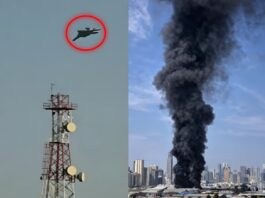China hopes that the US will remain committed to its promises regarding military actions in outer space, Chinese Foreign Ministry spokesman Wang Wenbin said on Tuesday.
On Monday, US Vice President Kamala Harris announced the decision to ban the country’s anti-satellite weapon tests as “destructive.”
“A piece of space debris the size of a basketball, which travels at thousands of miles per hour, would destroy a satellite. Even a piece of debris as small as a grain of sand could cause serious damage. We have consistently condemned these tests, “she said.
“I am pleased to announce that as of today, the United States commits not to conduct destructive direct-ascent anti-satellite missile testing,” Harris said.
“We hope that the American side will truly assume the obligations of a major power, revise a number of its own negative actions in outer space, stop the hypocritical practice of expanding its military superiority under the pretext of arms control, and stop blocking the process of coordinating legal documents on arms control in space,” Wang said, adding that the US is the first country in the world to test anti-satellite weapons.

The diplomat stressed that China has always advocated the peaceful use of outer space, noting that China and Russia in 2008 jointly submitted a draft treaty to the Conference on Disarmament which explicitly prohibits the deployment of weapons in space.
The Biden administration’s decision to impose a ban is reportedly in part due to Russia’s successful anti-satellite weapon system test in November 2021, when Moscow destroyed its old spacecraft Celina-D.
Moscow said the test was not directed at anyone and was carried out in accordance with international law, including the 1967 Outer Space Treaty. It also said because of the satellite’s location, the debris poses no threat to other spacecraft, including the International Space Station.
Russia Responds
Meanwhile, Russian Deputy Foreign Minister Sergey Ryabkov told Sputnik that Moscow considers Washington’s decision to impose a moratorium on tests of anti-satellite weapons as a move in the right direction.

“This is a step in the right direction. But here there are three additional points to which I would like to hear a reaction from the American side. Firstly, what about our well-known proposal for a moratorium on the deployment of medium-range missile systems, is the United States ready to return to its consideration in a positive way, and is it ready to commit itself not to deploy such systems anywhere in response to our moratorium?”
Ryabkov said, adding that another issue is that the US had already completed tests of anti-satellite weapons in the past.
“I would like to remind you of Russia’s proposal, together with China, to develop a treaty on not being the first to place weapons in outer space,” Ryabkov said, adding that Moscow calls on Washington to return to constructive negotiations on this issue.



